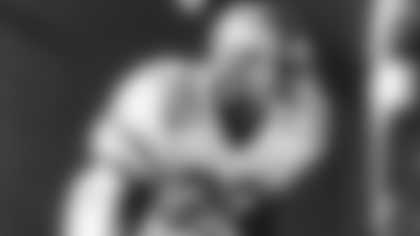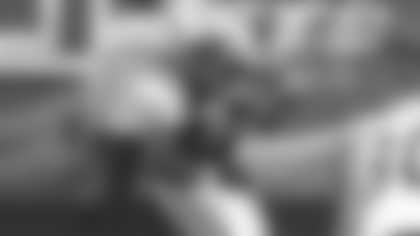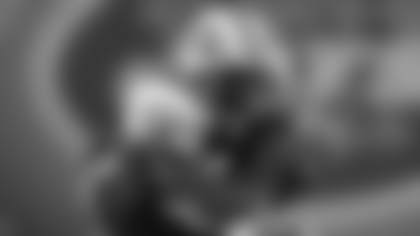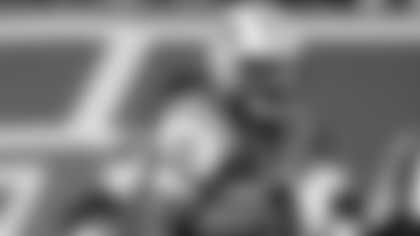
The Jets used their first-round pick in the 1971 NFL Draft to choose John Riggins, a running back from Kansas. They used their second-round pick on someone to help him get where he needed to go, John Mooring.
A tackle from the University of Tampa, New York's head coach Weeb Ewbank called Mooring, a Little College All-American, the best offensive lineman in the draft.
"I was very, very excited, naturally. I was from a real small town (Falfurrias) in South Texas. It was about 5,000 people. We were kind of in the middle of nowhere, actually," Mooring said. "Yeah. I was kind of concerned about how to get around and how I was going to adapt to it. But I thought, wow, New York, huh? Okay, we'll give it a shot."
Before any shots could be taken by Mooring or Riggins, for that matter, they missed the first two weeks of training camp because they were practicing for and playing in the then-annual College All-Star Game in Chicago, where they faced the defending Super Bowl champion Baltimore Colts.
They lost the game as well as valuable time, finding themselves 14 days behind their new teammates.
"It was kind of shocking when I got in," Mooring said. "It was almost dark and I had to suit up and we went and played a semi-pro team in Bridgeport, Connecticut. I didn't know anybody and went to play. Obviously, the Jets don't do that anymore."
Even though Mooring had the experience, having played tackle in college, that was a position where the Jets were all set with future Hall of Famer Winston Hill and Bob Svihus, a seventh-year veteran that they acquired in a trade with Oakland during training camp.
And so the rookie showed his versatility and played elsewhere. A solid backup, who started a couple of games at right guard for Dave Herman his first year, he played on special teams, goal-line defense, and at every position on the offensive line his second season. Including at center against Baltimore when John Schmitt was injured.
"You don't really have time to think about it. In those days, I think we carried eight linemen because your roster was only 40 men. You just switch in there and do what you're told and try to adjust. It's all kind of a whirlwind, I guess you'd say," Mooring said.
"When we were playing the Colts and Schmitt got hurt, I switched in to play center. And that turned out to be a kind of a historic game, actually, where Johnny Unitas and Joe Namath set a record for the most passing yards [872] in a game. I felt like I did pretty good. We won (44-34) and I didn't get to get beat. My man didn't get to the quarterback.
"Obviously, you want to come in and (be a full-time starter), but that didn't work out. And so I ended up playing different positions. Roger Finnie was also in that group. He ended up going to St. Louis and having a great career. And Dave Foley, he was traded to Buffalo. He was a real good run blocker, and had a good career run blocking there for O.J. (Simpson)."
In 1974, after three seasons with the Jets when he didn't miss a game, Mooring found himself as the one who was on the trading block. Charley Winner, who took over as head coach after Ewbank stepped off the sideline and concentrated on being the general manager, told Mooring that he wanted him to be the long snapper.
"I more or less didn't fall in line with the long snapping," Mooring said. "We were doing two-a-days and I got a knock on the (dorm room) door and someone says, 'Hey, Don Shula is on the phone.' And I said, 'Oh, man. Really?' So I knew what that was. Shula said, 'We just traded for you. We're happy to get you in. I want you to come down here and play left tackle.'
"That was on a Thursday, and I said, 'I guess I can be there maybe Saturday or Sunday.' And he said, 'We want you here tonight.' So I had to go out and buy some luggage and get on a plane and leave my car there. I got (to Miami) about 1:30 by the time we got to the training camp, and the next morning about 6:30, I was pass-blocking against their defensive linemen.
"We had a couple of preseason games, starting up in Chicago, and the offensive line coach said, 'This game will be the deciding point in your career with Miami.' So I was nervous. Richard Harris, the defensive end, that's the guy I was up against most of the time, and first off, I got a holding penalty.
"I didn't know the offense that well yet, and on the goal line, I made an incorrect call, calling the tight end down on a cross-block and the defensive guy made a tackle. And so I was like, 'Wow! I get a holding penalty and then this. Shoot, I'm going to get cut for sure.' And then, of course, Richard Harris beat me to the quarterback later on in the game. And so it was, 'Sheesh, my whole life I wanted to play football and this is it. Right now. This is the end.' I was so caught up and nervous and everything. Anyway, sure enough, I got cut that next day and New Orleans picked me up."
With the Saints for one season after three in New York, what are Mooring's fondest memories from his time with the Jets?
"Going to New York was scary, but once you got into the team there, Weeb was kind of like a granddaddy," he said. "He was just a good person. And our clubhouse was full of good people. Winston Hill and Joe Namath. Emerson Boozer. A lot of the offensive linemen were just some real good people. And Weeb made it, you wanted to play for him. I think that's the best memory that I have being there with the team."
Making their home on a 55-acre farm in Kingsbury, TX, Mooring and his wife, Belinda, have two adult children: John Wesley and Marianna, and 13 grandchildren. He retired from the insurance business six years ago.
"When I was growing up, it was either you become a coach or you become an insurance agent, and coaching wasn't paying too well," Mooring laughed. "I kind of went into insurance because just monetarily speaking, I wanted the best opportunity I could. And State Farm, the company I worked for, it was a good run. Forty-two years. I had a nice agency.
"Dealing with people, getting to know people and helping them out, you have to feel good about yourself and about what you're doing. And doing it with integrity. So they can trust you and know that whatever you say is going to be the truth. And sometimes it's a real hard truth. You know, people end up learning that you're honest and you're going to take care of them. Consequently, you build an agency because of that."














